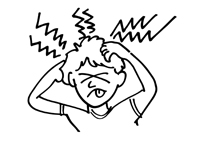THE NEWS – HANDLING HEADACHES
Published: The News – January 16, 2011
An enlightening interactive
session with a doctor on pain management and emergency
In a country where questioning and open discussion on certain subjects can turn volatile, guidelines on health issues are most welcome by everyone. What can be better than someone talking to you about yourself — not just talk but address your problems and give possible solutions because the person is equipped to do that.
In a one room office on the 7th floor of a newly built building, divided creatively into many sections with corrugated paper, Dr. Ali Javaid, a neuro psychiatrist held an interactive session last Wednesday on different types of headaches and their management with a bunch of men, women and children present there. The topic was ‘Improving stress coping skills — headaches and basic life support’.
Starting from signs that are alarming, he talked about migraine, a form of headache many people are cognizant of and suffer, cluster headache and headaches due to tension and outward stimuli.
Headache in the morning when one wakes up is not frightening as such. It is when you try to get up and sit on bed and feel sharp pain at that moment is a cause for concern. Unable to balance oneself during headache is another warning sign and fever that is 103 degrees or up with headache is also not to be taken lightly. In all the above cases the doctor advised to go to hospital, have a CT scan or an MRI.
What many people mistake as migraine is not migraine. It is mostly accompanied by vomiting and the pain is severe. Noise and light aggravate this headache so it is strongly advised to shut oneself up in a quiet, dark room. The doctor advised against massage or tying cloth around head in case of migraine. That would only aggravate the pain.
Migraine mostly occurs first in early twenties and if it passes to the next generation, it appears in teen age. There are people who feel that the attack is coming well before it actually occurs. Dr. Ali Javaid suggested taking a tablet of Topamax 25mg daily to avert migraine attack. Regular walk and exercise lessens incidence of such attacks and that has been proven. People from the audience shared their experiences and affirmed what the doctor told everyone.
Massage helps in headaches arising from tension — that can be in the temples, in the whole head or rising from eyes and going backwards. Dr Ali Javaid demonstrated how to do massage — put three fingers on the temples and thumb at the back and press and move them downwards. The fingers can move down on the sides of the spine then. This relieves pain.
Cluster headache is in a specific area, occur at a certain time for a specific duration and can be intense. It is particularly found in men. Then there is headache accompanied by pain in jaws that is due to tooth infection and is commonly known as gingivitis. Pain on bending head is a sign of frontal sinusitis and is felt in winters. The doctor suggested taking steam after adding salt to hot water to get relief from headache.
Apart from this very informative and helpful session on headaches and their management Dr. Ali who is in Lahore on a visit from the US, gave the audience demonstration in emergency handling or CPR. The first thing is to ask the person if he/she is alright and can hear you. The second step is to swap index finger inside the mouth of the injured person to clear the airway. Third step is to hear breathing by putting ones ear to the injured person’s chest. Fourth step is to check pulse on the neck and wrist. Fifth step is to put pressure on the chest with both hands on each other and count while pumping. Count till 30 then breathe twice into the mouth of the person. Repeat this once more if necessary. It helps to sprinkle water on the face but it doesn’t help to give water to drink. The doctor told people to remember A, B, C here — A for airway, B for breathing and C for circulation.
Most people found the session with the doctor most informative and helpful.
Holding free talks, demonstrations and discussions on issues that are directly related to individuals and that provide them with knowledge that can enhance quality of their life, is something that Institute for Peace and Secular Studies is doing in the city. They must be appreciated for this.
— Saadia Salahuddin
